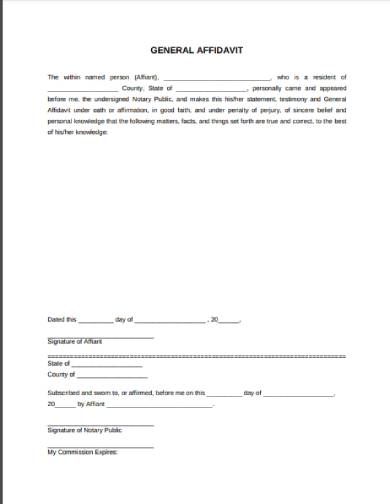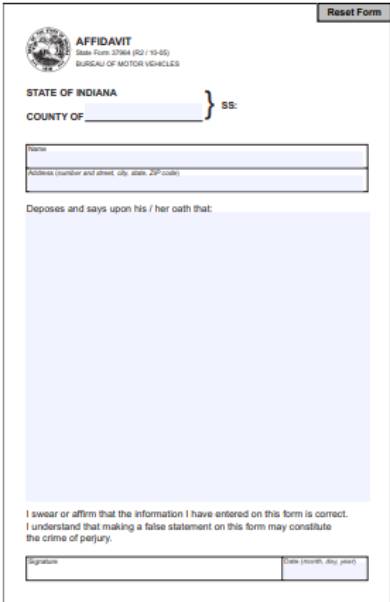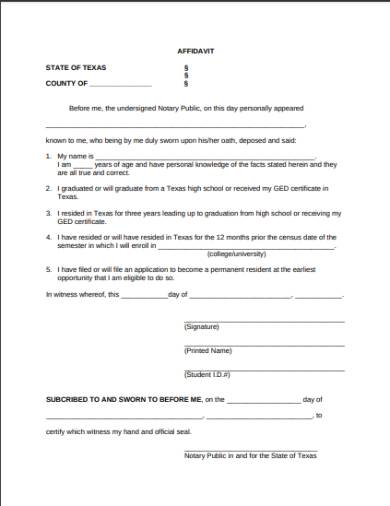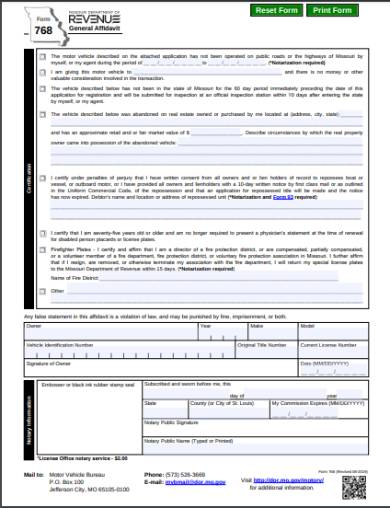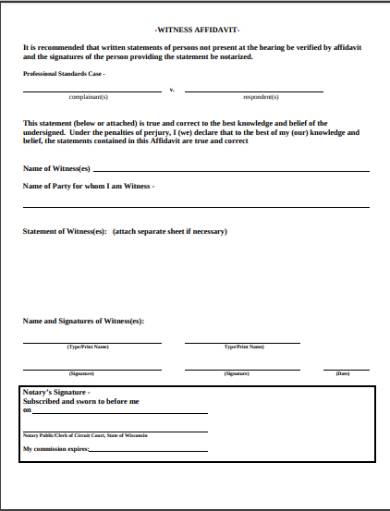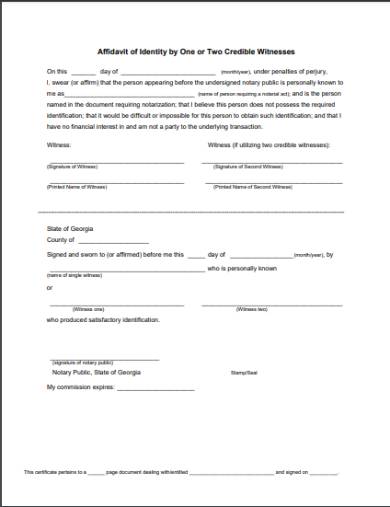While everything, under the sun, communicated orally are often seen as unreliable, albeit its common usage. Thus, in today’s age of constant verification and affirmation, anything passed on orally will always be treated with utmost scrutiny from society. Gossips and rumors, despite being the source of encyclopedic knowledge among old wives, will not stand in the court of law when establishing the truth of the matter and fact. So when it comes to attesting and proving the truth in a case, witness statements needed to be written and sworn under oath so that it becomes credible enough to stand in court. These written testaments are called Testimonial Affidavits.
What is a Testimonial Affidavit Form?
Testimonial Affidavits are written testimonies, sworn under oath in front of a person authorized by law, attesting to the truth of the matter and fact. These testimonies are written in a Testimonial Affidavit Form, which are notarized by a notary public and submitted in court for evidence. These legal forms are then examined to determine if the testimonies would be admissible as evidence against a case.
FREE 5+ Testimonial Affidavit Forms in PDF
1. General Testimonial Affidavit Form
2. Sample Testimonial Affidavit Form
3. Testimonial Affidavit Form Sample
4. Sample General Testimonial Affidavit Form
5. Witness Testimonial Affidavit Form
6. Multiple Witness Testimonial Affidavit Form
Where are Testimonial Affidavits used?
Testimonial Affidavits are testimonies written by parties in a legal case in order to establish each other’s argument’s point. Parties make these testimonies in a legal case in an attempt to let the court hear each party’s side of the story according to their perspectives. Testimonial affidavits can be both in oral or written form. However, the latter bears more weight than the former when used to separate fact between fiction and discern the truth in legal proceedings. Also, written testimonies are used by both the prosecution and the defense for cross-examination and to add case leads for further investigation.
Testimonial Affidavits are documents required by the law to be furnished by parties involved in a legal case. It is to ensure the transparency and fairness of court trials and its subsequent decisions and rulings about the case. Written testimonies in legal cases, especially those that involve crimes, may mean denying the accused their liberties, and even their lives as well. One such case is of George Stinney Jr., the youngest person sentenced to death in US history. The kid was only 14 when he was convicted of the murder of two young girls in South Carolina. Stinney, who lived near where the bodies of the two victims were found. He was eventually brought in for questioning on which “The police claimed to have obtained a confession but made no written record.” The following events led to Stinney being wrongfully convicted and later executed.
Testimonial Affidavits are also used in minor legal cases such as vying for child custody or termination of child support. Regardless of the magnitude of a lawsuit, testimonial affidavits are generally required in order for the jury to review the case and decide on it. These affidavits will spell the difference between successfully winning your case, or, you ending up in jail.
How to File a Testimonial Affidavit Forms
Testimonial Affidavit Forms can be filed by everyone who needs the court to hear their side of the case. They can be filed by old wives in dispute with their neighbors, Dads who wish to waive their rights over their kids, or even by employees who are wrongfully terminated from the jobs they loved. Whoever you are, whether you’re rich or poor, black or white, the constitution says you have rights, more so, is the right to have your side heard. So to get you started in making your cries of justice be heard, here are the steps on how to file your Testimonial Affidavit Form.
Step 1. Get a Testimonial Affidavit Form
Get a Testimonial Affidavit Form from a list of samples that this article provides. Choose among a variety of Testimonial Affidavit Form Samples that you can use and download for free. And in choosing your Testimonial Affidavit Form, make sure you chose the ones that are from the state that you are located. Then, hit the download button after you’ve chosen the one that suits your purpose.
Step 2. Edit the Testimonial Affidavit Form
Edit the Testimonial Affidavit Form after you’ve downloaded it. To start, simply replace the words or phrases that had nothing to do with your case. For example, you’re to use the form to appeal for child custody, and the form you got is for child support termination, replace the word “termination” with “custody.” Remember, you’re preparing this form to win your case, not to embarrass yourself.
Step 3. Fill out the Testimonial Affidavit Form
Fill out the Testimonial Affidavit Form after you’re done editing the form to your purpose. The fields that you need to fill out are the ones that ask for your name, name of the witnesses, and date of when it is executed. Make sure that you correctly filled these fields to avoid repeating the whole process all over again.
Step 4. Print the Testimonial Affidavit Form
Print the Testimonial Affidavit Form after completing the previous steps above. You can print your Testimonial Affidavit Form using your home or office printer, whichever works for you. Then, affix your signature on the signature block intended for it. Also, have the form signed by the witnesses as well.
Step 5. Have the Testimonial Affidavit Form Notarized
Lastly, have your Testimonial Affidavit Form notarized by a public notary near you. Notarizing your Testimonial Affidavit Form makes your testimony admissible in court, which means that the court will use it against the opposing party of the case. Likewise, it also means that you are liable for perjury if you recant everything in the affidavit since you swore about its truth, under oath. In notarizing your Testimonial Affidavit Form, you will have to pay a small fee for it to be stamped with a seal. Lastly, hand your Testimonial Affidavit Form to your attorney after notarizing it.
Related Posts
-
Affidavit Form
-
What Is An Affidavit Form? [ Types ]
-
What Is an Affidavit of Birth? [ Definition, Uses ]
-
Affidavit of Residency Form
-
Vehicle Affidavit Form
-
10 Steps in Filling out and Writing an Affidavit
-
Student Affidavit Form
-
Birth Affidavit Form
-
Consent Affidavit Form
-
FREE 16+ Affidavit Support Forms in PDF | MS Word
-
Bank Affidavit Form
-
Gift Affidavit Form
-
FREE 11+ Contractor Affidavit Forms in PDF | MS Word | Excel
-
FREE 9+ Sample General Affidavit Forms in PDF | Excel | MS Word
-
FREE 12+ Affidavit Forms and Samples in PDF | Excel | MS Word

